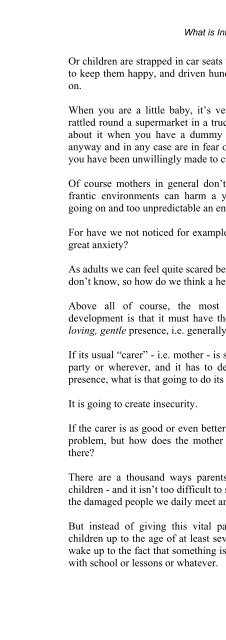07.+What+is+Intelligence+(February+2006) - Get a Free Blog
07.+What+is+Intelligence+(February+2006) - Get a Free Blog
07.+What+is+Intelligence+(February+2006) - Get a Free Blog
Create successful ePaper yourself
Turn your PDF publications into a flip-book with our unique Google optimized e-Paper software.
What is Intelligence? 138<br />
Or children are strapped in car seats with a dummy shoved in their mouth<br />
to keep them happy, and driven hundreds of miles round the road and so<br />
on.<br />
When you are a little baby, it’s very scary and over-stimulating to be<br />
rattled round a supermarket in a truck, but you can’t complain too much<br />
about it when you have a dummy shoved in your mouth, can’t speak<br />
anyway and in any case are in fear of your life at this strange busy place<br />
you have been unwillingly made to circuit round.<br />
Of course mothers in general don’t remotely realise that these kind of<br />
frantic environments can harm a young child with too much activity<br />
going on and too unpredictable an environment.<br />
For have we not noticed for example how babies react to a stranger with<br />
great anxiety?<br />
As adults we can feel quite scared being in a strange place with people we<br />
don’t know, so how do we think a helpless child is going to feel?<br />
Above all of course, the most critical factor in a child’s early<br />
development is that it must have the security of one constant, familiar,<br />
loving, gentle presence, i.e. generally speaking its mother.<br />
If its usual “carer” - i.e. mother - is suddenly whisked away to work, or a<br />
party or wherever, and it has to deal with another far less predictable<br />
presence, what is that going to do its psyche over time?<br />
It is going to create insecurity.<br />
If the carer is as good or even better than the mother, that might not be a<br />
problem, but how does the mother know what happens when she isn’t<br />
there?<br />
There are a thousand ways parents can get it wrong - the raising of<br />
children - and it isn’t too difficult to see the consequences all around us in<br />
the damaged people we daily meet and see.<br />
But instead of giving this vital patient and consistent care to young<br />
children up to the age of at least seven, and preferably ten or eleven, we<br />
wake up to the fact that something is wrong with our child – it can’t cope<br />
with school or lessons or whatever.


